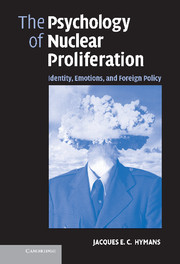Book contents
- Frontmatter
- Contents
- List of figures
- List of tables
- Preface
- List of acronyms and abbreviations
- 1 Introduction: life in a nuclear-capable crowd
- 2 Leaders' national identity conceptions and nuclear choices
- 3 Measuring leaders' national identity conceptions
- 4 The struggle over the bomb in the French Fourth Republic
- 5 Australia's search for security: nuclear umbrella, armament, or abolition?
- 6 Argentina's nuclear ambition – and restraint
- 7 “We have a big bomb now”: India's nuclear U-turn
- 8 Conclusion: lessons for policy
- Appendix: Coding rules and results
- Bibliography
- Name index
- Subject index
2 - Leaders' national identity conceptions and nuclear choices
Published online by Cambridge University Press: 22 September 2009
- Frontmatter
- Contents
- List of figures
- List of tables
- Preface
- List of acronyms and abbreviations
- 1 Introduction: life in a nuclear-capable crowd
- 2 Leaders' national identity conceptions and nuclear choices
- 3 Measuring leaders' national identity conceptions
- 4 The struggle over the bomb in the French Fourth Republic
- 5 Australia's search for security: nuclear umbrella, armament, or abolition?
- 6 Argentina's nuclear ambition – and restraint
- 7 “We have a big bomb now”: India's nuclear U-turn
- 8 Conclusion: lessons for policy
- Appendix: Coding rules and results
- Bibliography
- Name index
- Subject index
Summary
In Chapter 1, I questioned why the nuclear proliferation literature generally takes state demand for nuclear weapons as practically a given, when in fact the acquisition of the bomb represents a leap in the dark on many dimensions. I argued that rather than asking, “Why are there so few nuclear weapons states?” we instead need to ask, “Why are there any at all?” But this is hardly a rhetorical question. Some leaders have indeed decided to endow their states with the bomb. What is more, in spite of the immense difficulties of making a clear cost–benefit calculation on this matter, leaders have often displayed breathtaking certitude in the rightness of their choices. How could this be? This chapter provides a detailed account of how, as indicated in Chapter 1, leaders' conceptions of their nation's identity (what I will call their “national identity conceptions” or NICs) drive their choices for or against the bomb. Most leaders' NICs do not lend themselves to embarking on such a perilous adventure. But others' NICs do produce a preference – and indeed, an emotional need – to reach for that instrument of unlimited destruction.
The chapter is organized as follows. The second part establishes the plausibility of the idea that “big decisions” such as the choice to go nuclear are likely to stem from leaders' NICs. The third part develops a more precise description of the NIC concept and lays out a typology of NICs.
- Type
- Chapter
- Information
- The Psychology of Nuclear ProliferationIdentity, Emotions and Foreign Policy, pp. 16 - 46Publisher: Cambridge University PressPrint publication year: 2006



